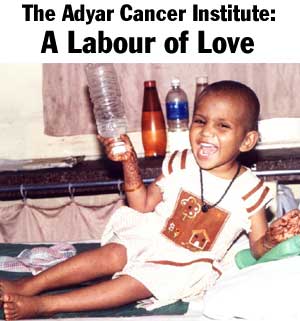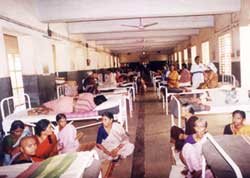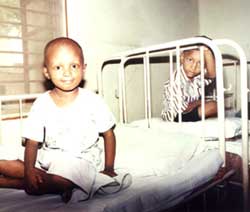
Three-year-old Akhila clutched the water bottle close to her chest and giggled. She rolled on the bed and giggled some more when the flash bulb went off. She opened and closed her little palms and giggled again as she showed off her hennaed hands and asked, "Isn't the mehndi beautiful?"
There's nothing in the world that does not make Akhila happy; be it a water bottle, a flash bulb or a little toy car Everything gives her joy; every new face makes her smile.
It was a different story seven months ago. Then Akhila couldn't even lift her head due to incessant fever and vomiting. After days of investigation and several injections, the doctors told her mother Selvi her little daughter was suffering from blood cancer and the treatment would cost her Rs 80,000 to Rs 100,000. Selvi had no idea where she and her husband, a fruit seller, could get that much money.
The doctors advised her to go to Chennai and get Akhila treated at the Adyar Cancer Institute where poor patients are given free treatment.
Selvi left her two other daughters with her mother and came to Chennai. After several courses of chemotherapy, Akhila is once again her usual self; giggling and playing.
"I have been staying here with my daughter for the last seven months. I have no money to go back to my village and return often for treatment. We are very poor. I stay here, and eat a part of the food given to my daughter. If not for this hospital, I do not know how I would have treated my daughter," she says, with tears in her eyes.
If Selvi came from an interior village in Tamil Nadu, Kaveri and her daughter came from Andhra Pradesh. Another mother and daughter are from Guwahati.
Every day, many such desperate people from various parts of India come to the Adyar Cancer Institute, which is reputed as one of the best hospitals for cancer patients. It is also known to treat those who cannot afford the disease's exorbitant treatment for free.
June 18, 1954
Dr Muthulakshmi Reddy, India's first woman medical graduate and a social reformer, fulfilled a long-cherished dream; she began the Adyar Cancer Institute in Chennai.
Dr Reddy had lost her young sister to cancer in 1923. Her sister was being treated at India's only specialised cancer hospital, located in Patna, Bihar. It set her thinking. She could afford to take her sister to Patna. What about the poor?
So Dr Reddy sent her only son, S Krishnamurthy, to the United States, Switzerland and the UK to train in cancer treatment. When he returned, the Adyar Cancer Institute was formed with the objective of providing the best cancer treatment to the poor.
They were joined by Dr V Shanta. As a house surgeon in 1950, she had seen Dr Krishnamurthy work in the cancer unit of the government-run General Hospital. She had heard him talk to large audiences about the plight of poor cancer patients. "It was very moving. I felt I should participate in their effort," she says.
The Institute began with two doctors, Krishnamurthy and Shanta, a single building with minimal diagnostic and therapeutic facilities and a cluster of 12 huts to house the patients. The only cancer hospital in south India, it was established with public donations as a voluntary, charitable, non-profit institution.
"It was a very difficult journey. Finances were hard to come by and daily existence was a struggle. It was a frustrating and painful period because people did not understand us. The first thing people asked me those days was, 'Where were you trained?' My reply, 'Here in India, in Madras,' did not make many happy!" Dr Shanta, who took over as the Institute's director and chairperson when Dr Krishnamurthy retired in 1979, recalls.
Another person who has been with the Institute since the beginning is Matron Janaki. As she immersed herself in her work, she even "forgot to marry." "I got attached to the hospital, the patients and my work. My life is this hospital because I spend 24 hours a day, 365 days a year here. Even though I am 60, I continue to work here as I have no other home.
Dr Shanta says the Institute grew because of "international philanthropy," especially from Christian organisations. Now, aid is hard to come by because 'they feel India has developed.'
The Institute's first break came on Christmas eve, 1956, when Atomic Energy, Canada, gifted a Cobalt-60 Teletherapy unit (radiation therapy machine); it was the first such unit in Asia.
Several firsts
The Institute has several other firsts to its credit. They include:
-
A department of Nuclear Medical Oncology in 1956;
-
Paediatric oncology in 1960;
-
Installing a linear accelerator in 1976;
-
Introducing Blood Component Therapy in 1978;
-
Introducing Hypothermia treatment in 1984;
-
Installing a ND-YAG Surgical Laser in 1985 and performing endoscopic laser surgery;
-
The only institute where Intra-operative Electron Therapy is available since 1992.
After 49 years...

The Institute has a hospital, a research centre, a centre of preventive oncology, and a College of Oncology Sciences (a postgraduate college that conducts super-speciality courses in surgical oncology and medical oncology).
Its centre for preventive oncology has been working in conjunction with non-government organisations and government hospitals to conduct cancer screening camps and PAP smear tests at the district level and in various parts of the city.
The Institute's hereditary cancer clinic, the first in the country, is studying the genetic factors related to the disease.
The Tobacco Cessation Clinic has been helping people to fight various forms of tobacco consumption, which is the most common cause for cancer.
Annually, more than 95,000 to 100,000 patients from all parts of India visit the hospital; hardly 0.5 per cent of whom are covered by health insurance. In fact, only 15 to 20 per cent of the population can afford treatment at private hospitals; the rest have to depend on hospitals like the Adyar Cancer Institute or government hospitals where treatment is either free or subsidised.
Last year alone, the Institute -- which has 428 beds of which 297 are free -- saw nearly one lakh (100,000) patients, of which 60 per cent were given for free treatment. The number of patients coming to the hospital has been increasing each year. Generally, two-thirds of them get free or subsidised treatment.
"In the present day environment of corporate medicare, we are trying to see whether a charitable, non-profit, non-government organisation can continue to provide the state-of-the-art care irrespective of the patient's economic or social status. That is why we need everyone's support," Dr Shanta said.
Dr Ravi Kannan, professor and head, surgical oncology was frank, "Because we treat poor people, there is a feeling among the rich that we are not up to the mark, which is sad. Our expertise and infrastructure are the best in Asia. Many people find it infradig to come and get treated along with poor patients. So, to run a charitable hospital which offers state-of-the-art treatment is an uphill task."
Dr Shanta, who tried to lead by example, says, "If our doctors worked in a corporate set-up, they would probably earn three to four times the salary they are drawing here. In fact, we only manage to retain a fraction of the people we train here. It is a great loss. Our alumni are all over the world and all over India, but very few stick here because we cannot offer fat salaries. It is certainly disheartening when you see them go, but then they are spreading the message of the Institute elsewhere."
Dr Kannan added, "Those who stay behind are committed to the cause."
At present, the Institute is staffed by 150 medical and non-medical doctors, 134 nurses and 70 technicians. And it remains in need of financial aid.
Friends of the Cancer Institute

The Institute's annual budget, excluding research and new equipment, is Rs 20 crore (Rs 200 million). This amount goes exclusively towards providing treatment and maintaining the hospital and its equipment.
A year ago, a group of 10 professionals from different walks of life, who had experienced the way the Institute functions, formed the 'Friends of the Cancer Institute.' The group meets every Monday evening -- Dr Kannan makes it a point to attend these meetings -- to chalk out a program for the week; each member donates at least an hour a day for work connected with the Institute.
Lakshmi, a 'friend,' says, "We found that, though the hospital is world class, only the poor came here. This phenomenon has affected the Institute financially. We felt they are low-key and have never worked at selling their image. So we decided to build its image as a top class hospital that is doing an excellent job in fighting cancer."
That was how Iruvathu varai iruvathu (20 till 20), an innovative way of raising money, was born. Advertising agency Lintas pitched in with their expertise. 'Friends of the Cancer Institute' plan to collect Rs 20 crore by selling coupons worth Rs 20. "Chennai has a population of one crore [10 million]. In one year, we plan to collect Rs 20 crore by selling Rs 20 coupons," Lakshmi said.
Dr Kannan admitted the response to media reports on actor Kamal Haasan launching the Rs 20 coupons was unprecedented.
"Our idea was to involve the community in our endeavour. The response has been quite gratifying," says a pleased Dr Kannan.
For more information, please contact The Adyar Cancer Institute, Gandhi Nagar, Adyar, Chennai -- 600 020, Tamil Nadu, India.





